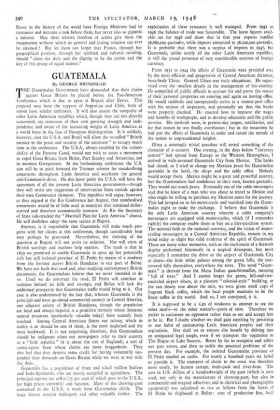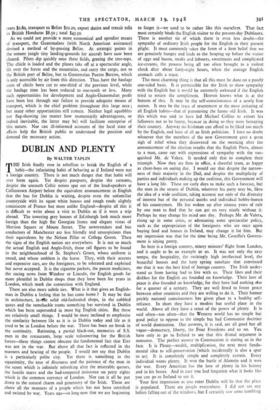GUATEMALA
By GEORGE BRINSMEAD
THE Guatemalan Government have demanded that their claims against Great Britain be placed before the Pan-American Conference which is due to open at Bogota after Easter. This proposal may have the support of Argentina and Chile, both of whom have similar ambitions. It will also arouse the sympathy of other Latin American republics which, though they are not directly concerned, are conscious of their own growing strength and inde- pendence and aware of the increasing weight of Latin America as a world force in the face of European disintegration. It is unlikely, however, that the U.S.A. and Brazil will allow the so-called " British menace to the peace and security of the continent " to occupy much time at the conference. The U.S.A., always troubled by the vulner- ability of the Panama Canal, would not wish to assist a movement to expel Great Britain from Belize, Port Stanley and Antarctica, not to mention Georgetown. At the forthcoming conference the U.S. aim will be to push forward the Truman scheme for standardising armaments throughout Latin America and accelerate the general anti-Communist drive. On this latter point the U.S.A. will have the agreement of all the present Latin American governments—though they will resist any suggestion of intervention from outside against their own Communist elements. The republics will argue, however, as they argued at the Rio Conference last August, that standardised armaments would be of little avail in countries that remained dollar= starved and therefore economically insecure. At Rio the Secretary of State side-tracked the " Marshall Plan for Latin America " chorus. He will doubtless adop• the same tactics at Bogota.
Anyway, it is improbable that Guatemala will make much pro- gress with her claims at. this conference, though considerable heat may perhaps be generated. Nevertheless, the shelving of the question at Bogota will not assist its solution. Nor will visits of British warships and marines help matters. The truth is that in 1859 we promised to enable Guatemala to open up her potentially rich but still isolated province of El Peten by means of a roadway from the frontier across British Honduras to our port of Belize. We have not built that road and, after studying contemporary British documents, the Guatemalans believe that we never intended to do so. Until we do construct the road, El Peten will continue in isolation behind its hills and swamps, and Belize will lack the additional prosperity that Guatemalan traffic would bring to it. Our case is also undermined by the fact that, whereas Guatemala is the principal and most go-ahead commercial country in Central America, our adjacent colony of British Honduras, though the population are loyal and always hopeful, is a primitive territory whose immense. natural resources (particularly valuable today) have scarcely been touched. Among Central American States our colony, which in reality is or should be one of them, is the most neglected and the most backward. It is not surprising, therefore, that Guatemalans should be indignant when our newspapers refer to their country as a " little republic " (it is about the size of England), a sort of comic-opera State whose claims are mere braggadocio. They also feel that they deserve some credit for having voluntarily sus- pended their demands on Great Britain while we were at war with the Axis.
Guatemala has a population of three and a-half million Indians and Indo-Spaniards, who arc mostly occupied in agriculture. The principal exports are coffee (75 per cent of which goes to the U.S.A., for high prices currently) and bananas. Most of the chewing-gum consumed in the U.S.A. is made from Guatemalan chicle. The huge forests contain mahogany and other valuable timber. The exploitation of these 'resources is well managed.• From 1941 to 1946 the balance of trade was favourable. .The latest figures avail- able are for 1946 and show that in that year exports totalled 36,680,000 quetzales, while imports amounted to 36,200,000 quetzales. It is probable that there was a surplus of imports in 1947, but Guatemala, unlike nearly all the other Latin American republics, is still the proud possessor of very considerable reserves of foreign currency.
From 1931 to 1944 the affairs of Guatemala were presided over by the most efficient and progressive of Central American dictators, busy-body Ubico. General Ubico was truly ubiquitous. He super- vised even the smallest details in the management of his- country. He compelled all public officials to account for and prove the source of their personal properties on entering and again on leaving office. He would suddenly and unexpectedly arrive at a remote post office with his retinue of inspectors, and personally see that the books were properly checked. He enacted laws to improve the wages and benefits of workpeople, and to develop education and the public services. His methods were, in present-day jargon, totalitarian, and for that reason he was finally overthrown ; but in the meantime he had put the affairs of Guatemala in order and raised the morale of the nation to unprecedented heights.
Often a seemingly trivial anecdote will reveal something of the character of a country. One evening, in the days before " currency control" had spread from Europe to the Western Hemisphere, I arrived in wide-avenued Guatemala City from Mexico. The banks had closed, so I tried to change my Mexican pesos for Guatemalan quetzales in the hotel, the shops and the cable office. Nobody would accept them. Mexico might be a great and powerful country, but the Guatemalans had confidence in their own, known quetzales. They would not touch pesos. Eventually one of the cable messengers said that he knew of a man who was about to travel to Mexico and who might be willing to purchase my Mexican notes for the journey. This lad jumped on to his motor-cycle and vanished into the Guate- malan night to make the exchange. I believe that Guatemala is the only Latin American country wherein a cable company's messengers are equipped with motor-cycles, which (if I remember rightly) the company enable them to buy on a hire-purchase system. The national faith in the national currency, and the vision of motor- cycling messengers in a Central American Republic, remain in my mind today as slight but valid evidence of the spirit of Guatemala. There are many other memories, such as the excitement of a firework display performed hilariously in a tropical downpour, but most especially I remember the drive to the airport of Guatemala City at dawn—the little white palaces among the green hills, the tree- covered hills themselves, everywhere the trees. The word " Guate- mala " is derived from the Maya Indian quauhitemallan, meaning " full of trees." And I cannot forget the green, hill-and-tree- encircled airport where, in a pleasant " colonial-style " building, as the sun slowly rose above the mist, we were given small cups of fragrant black coffee, which the local people maintain to be the finest coffee in the world. And so, I am convipced, it is.
It is supposed to be a sign of weakness to attempt to see the other man's—or the other nation's—point of view. Therefore we prefer to caricature an opponent rather than to see and accept him as he is. But I doubt whether we shall gain anything by persisting in our habit of caricaturing Latin American peoples and their aspirations. Nor shall we or anyone else benefit by delving into an antiquated legal jungle, even if we transport the vegetation to The Hague or Lake Success. Better by far to recognise and admit our past errors, and then to tackle the practical problems of the present day. For example, the isolated Guatemalan province of El Peten needed an outlet. For nearly a hundred years we failed to provide it. The transport of chicle to the coast was therefore most costly, by human cartage, mule-pack and river-boat. The cost in U.S. dollars of a hundredweight of the gum (which is now used, not only in the manufacture of chewing-gum, but also in commercial and surgical adhesives, and in ele6trical and photographic equipment)' was calculated to rise as follows from the forest of El Pet& to shipboard at Belize: cost of production $1o, local taxes $2.80, transport to Belize $22.20, export duties and transit tolls in British Honduras $8.50; total $43.50.
As we could not provide a more economical and speedier means of transport, the Guatemalans (with North American assistance) devised a method of by-passing Belize. At strategic points in the remote jungle tiny landing-grounds for aircraft have now been cleared. Pilots dip quickly onto these fields, grazing the tree-tops. The chicle is loaded and the planes take off at a spectacular angle, lift over the forest and the mountains, and carry the cargo, not to the British port of Belize, but to Guatemalan Puerto Barrios, which is only accessible by air from this direction. Thus have the haulage costs of chicle been cut to one-third of the previous level, while the haulage time has been reduced to one-tenth or less. Many such opportunities for development and Anglo-Guatemalan, profit have been lost through our failure to provide adequate means of transport, which is the chief problem throughout this large area ; but many other opportunities still remain. Neither legal squabbles nor flag-showing (no matter how momentarily advantageous, or indeed inevitable, the latter may be) will facilitate enterprise of this nature. Nor can ill-informed accounts of the local state of affairs help the British public to understand the position and demand the necessary action.































 Previous page
Previous page